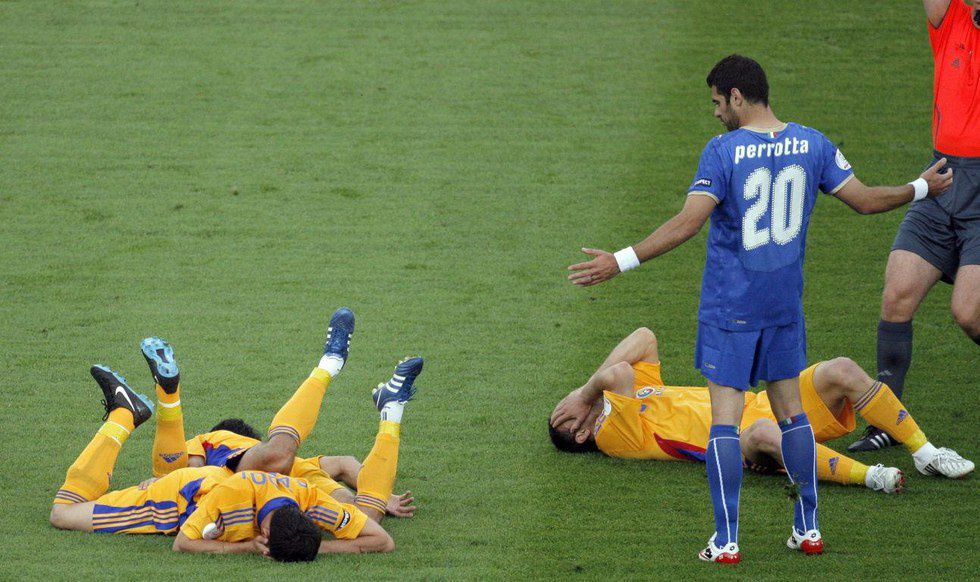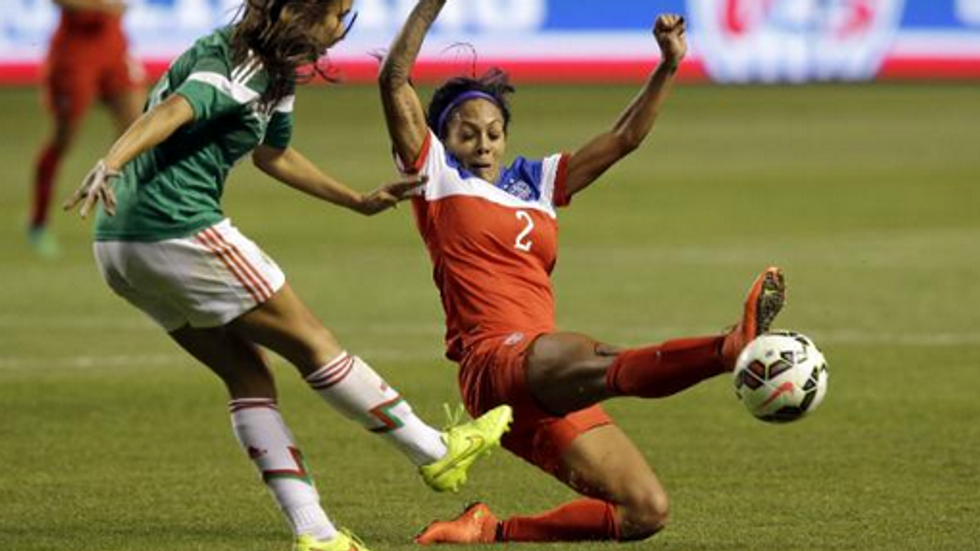From the Opinion of the Soccer Player - Danielle Fowler
Anyone who knows me understands that I am a sports fanatic; from Major League Baseball to college football, women's soccer, NFL, to even golf, I have an appreciation for the skill and dedication of each and every athlete. Hearing of Sports Illustrated writer Andy Benoit's comments about not only the unworthiness of the Women's World Cup, but also that of women's sports as a whole, I simply rolled my eyes. It was not the first time I've had this discussion with others and many have a hard time wrapping their heads around the fact that I don't want to argue- science proves so much and being a well rounded sports fan explains the rest.
I am well aware that men have more power and more strength than women; anatomy explains that for us. Two-thirds is the magic fraction. In a Livestrong article, they note:
"Women generally produce about two-thirds the amount of total strength and applied force that men produce. Women are also physically built so that they generally carry two-thirds as much muscle mass as men."
To my fellow females who will continue to make the argument that women are equally as strong as men, it's just not true. Unless you're a female body builder being compared to a man similar in stature to George Costanza of Seinfeld, men will always be stronger than women. This gives them more power behind their lifting, their strides, a swing of a bat, or a shot on goal. I learned this the hard way after challenging the club baseball team to a soccer matchup against our club soccer team. We held our own, but in the end, the height, strength, and speed of the boys we were playing against proved to work better than our skills. It was kind of a no brainer that they had the advantage, but one thing those men didn’t have on us was flexibility. Livestrong notes: "While men are taller and broader, built to carry and lift, women are more inclined to use muscular strength for tasks related to flexibility, coordination and balance." Yeah they were aggressive, looking for contact and tackles, but we used the coordination of our passing to our advantage.
So there you have it, different strokes for different folks, and in this case women and men have different things to showcase. Exhibit A: Baseball vs. Softball. Many harp on the fact that MLB stadiums are bigger; a 60 ft. first base line vs. a 90 ft. first base line is a huge difference, but a softball and baseball field are structured to the anatomy of the individual, allowing the athletes to play to the best of their ability AKA what anatomy lets them do.
Exhibit B: Women's World Cup vs. Men's World Cup. Men tend to go with more fancy footwork, faster dribbling down the line, and more power behind their shots, but with the Women's World Cup, there are more tactics. It is more of a mental game to us women. We build up from the defense, create intricate passing plays, and look for the gaps in the field to send through balls, allowing the wings to outrun the opposing defense. It's a different type of game, and you have to respect each league for it.
Amy Pohler and Seth Meyers expressed every rash comment I was tempted to write in this article during their “Really!?!” segment, but as a sports fan I know that the way one carries his or herself on the field is equally as important as the talent they possess, allowing the Women’s World Cup to take the cake in this argument (in my subtle opinion). It just seems like the women want to actually play, as opposed to making the game and their performance up for nominations for "Best Drama" at the Oscars. My dear friend Andy Benoit, would you rather see these men cry like babies after being tapped or slightly nudged in a shoulder to shoulder play during the Men's World Cup?
Or see the fire in the eyes of the "bad a$$ b!**h*s" on the US Women's National Team as they strive for first place at the Women's World Cup? as Amy Pohler argues.
Regardless of my semi - (un)biased opinions as a women's soccer player, playing the sport since I could walk, why can't we appreciate all sports for what they are? Why can't we see the talent it takes each athlete to train and to perfect their skills and the intricate muscle movements that are required to excel at these sports, at both a male and female level? Why can’t we all value that pride and character are essential characteristics of a true athlete and sports role model? Men’s vs. women’s sports should not be a thing, because anatomy proves it can’t be a thing. Let the men do what they do best, let the women do what they do best, and let's leave it at that.
From the Opinion of the Dancer - Zoe Ross-Nash
Growing up, going to BBQs killed me. My brother was a football player and I a ballerina. We were both very good at what we did. We’d talk over hot dogs and people would brush over my passion in conversations while his were glorified. Yet, they’d ask me if I had a boyfriend. I always questioned why this happened. Was the work I put in towards dance not as appreciated as the work he put in? Were my outcomes not as valuable?
I thought about what this did to my confidence and where I put my effort. Society showed me that my interests did not really matter, that it was just something I did to pass the time, that it wasn’t a part of me like my brother’s football career was to him. Years later I realized that people’s lack of interest in my hobby had nothing to do with my dedication, rather the fact that I am a female in the arts. People didn’t care. If I didn’t have my parents pushing me everyday, telling me my career was worthwhile, that I was more than just somebody’s girlfriend, I would never have been the dancer I was, and for that I have great pride. Ever stop and think women’s sports “aren’t worth watching” because we’ve engrained it into our society that they don’t really matter?
We go see ballets and we are in awe of the male dancers who possess such power and strength. With their multiple spins and high forceful jumps, they become the star of the show. They are who we watch. Meanwhile, the female dancers embody the same amount of ability just execute it differently. We see their masculinity as skill and their femininity as weakness. Therefore making women “not worth watching”. Yet we have ballerinas such as Misty Copeland who break every stereotype. She is strong and fearless. Her Under Armor video, “I will what I want” is huge reason ballet is even recognized as a difficult skill set to obtain. Maybe, just maybe, if people became more educated about women’s sports and the arts, they’d see how they are just as interesting as men’s sports. Or is masculinity really that fragile that society wouldn’t dare to compare the two?























